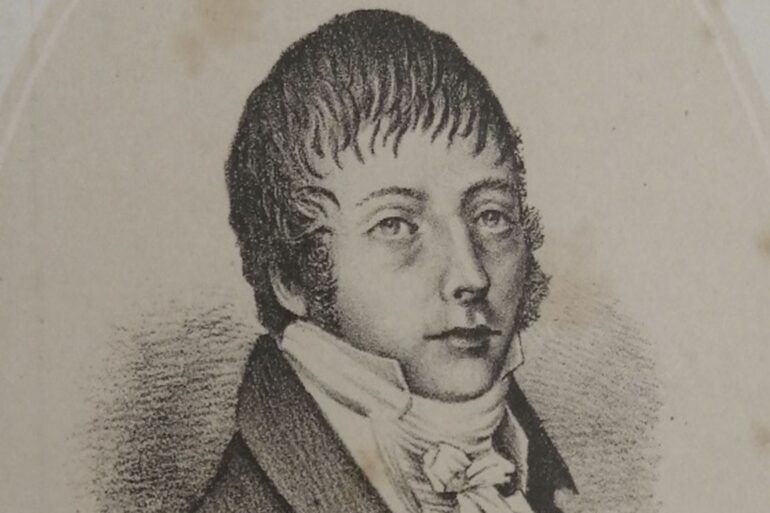Perhaps less well-known than “The Weaver Poet” Robert Tannahill, Ebenezer Picken was deemed the “Poet of Paisley”.
He was born c.1760s and was son to a weaver, and his father had high hopes he would enter the church. Picken had other plans, and while attending the University of Glasgow his obsession for poetry took hold with the publication of his first collection in 1787.
Picken pursued several career paths after studying clerical work, including starting a school in Falkirk and attempting to manage a business in Edinburgh. Through each occupational shift Picken and his family continually faced extreme poverty. Despite economic hardship Picken placed a high value on education ensuring both his sons and daughters had the best education possible and his daughter Joanna Picken also became a teacher and poet after immigrating to Quebec, Montreal.
Miscellaneous Poems and Songs, Partly in the Scottish Dialect with a Copious Glossary was published in 1813 and it is clear from Picken’s forward that despite his love of poetry his life had been taken over by commercial industry and the stress of his economic hardships with the pursuits in which he has lately been engaged, the cultivation of a taste for Poetry, seems almost incompatible. What is most striking is the glossary and dictionary of Scots to English that accompanied this collection and it is perhaps Picken’s greatest legacy. This work alongside his book Poems and Epistles Mostly in the Scottish Dialect published in 1788 were direct influences on John Jamieson’s creation of the Scottish Dictionary. Jamieson acknowledges this fact and refers continually to the words which were first identified by the native of Paisley. Picken had spent his life dedicated to honouring the Scots language and compiled over 5,000 words for his glossaries and dictionaries.
Close friends with the poet Alexander Wilson throughout his life the two published a pamphlet together in 1791 after debating the merits of the two poets Allan Ramsay and Robert Ferguson. Rather than a rivalry Wilson and Picken enjoyed a stimulating creative partnership and encouraged one another’s poetic endeavours. In Thomas Crichton’s biographical sketch of Alexander Wilson published in 1819 Picken is described as, an uncommonly clever young man, of a lively turn of mind, who shone pre-eminently in the social circle, but his strong desire to be an author prevailed over the dictates of prudence. It may have ultimately been this obsession with becoming an author that was to be part of Picken’s failings in his own lifetime, further described as one possessed with real poetic genius but that whose immaturity and inexperience in the ways of men led to many disappointments in his publications.
Picken died of tuberculosis (consumption) in Edinburgh in 1816, never having the success he dreamed of during his lifetime and even in death being overshadowed by other Scottish poets. There is no denying now that Picken is an important figure in the great legacy of Scots poets. His own dictionary was published posthumously and anonymously in 1818. In the preface to his Poem and Epistles of 1788 Picken wrote, from very early years, I inclined for that kind of poetry which exhibits the dialect of my native country; and my most genuine expectations would be gratified, if my juvenile performance might contribute in the least to advance the reputation of the Scottish Muse. These words are a clear indication of his desire and mission throughout his life to elevate Scots and explore the power of language, satire, and poetry, Picken surely has situated himself as one possessed with real poetic genius.
Ye gentle Maids, by Airy stream, Wi’ hearts sae light, wha sweetly stray; Nae mair o’joy or pleasure dream; But sign, an’ morn, the live lang day; Forsake your bonny willow bower; An’lanely court the greenwood shaw; For ye hae lost the sweetest flower; That airy water ever saw.

